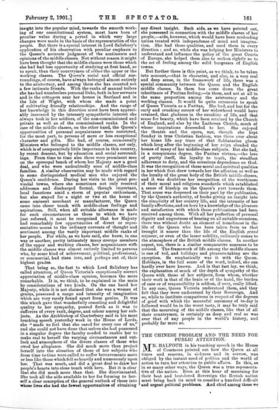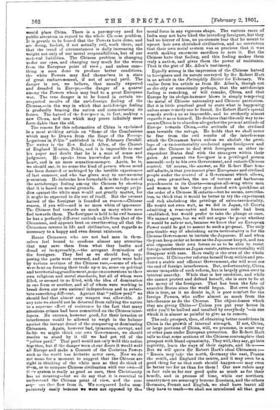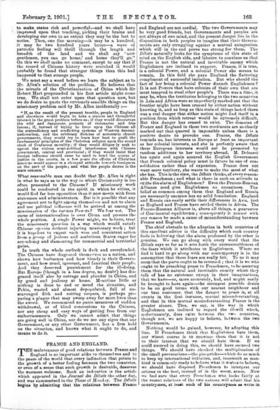THE CHINESE PROBLEM AND THE NEED FOR PUBLIC ATTENTION.
MR. BALFOUR in his touching speech in the House of Commons pointed out how the Queen at all times and seasons, in sickness and in sorrow, was obliged by the instant need of politics and the world of action to turn her attention to public affairs. In this, as in so many other ways, the Queen was a true representa- tive of the nation. Even at this hour of mourning for their best and best-loved Sovereign the British nation must bring back its mind to consider a hundred difficult and urgent political problems. And chief among these we would place China. There is a peremptory need for public attention in regard to the whole Chinese problem. It is greatly to be feared that the Powers have done, and are doing, foolish, if not actually. evil, work there, and that the trend of circumstances is daily increasing the weight not only of our moral responsibilities, but of our meterial liabilities. The Chinese problem is changing under our eyes, and changing very much for the worse from the European point of view ; and unless some- thing is soon done to produce better conditions. the white Powers may find themselves in a state of great embarrassment, if not of actual peril. The danger is not, we believe, that usually expected and dreaded in Europe,—the danger of a quarrel among the Powers which may lead to a great European war. The true danger is to be found in certain un- suspected results of the anti-foreign feeling of the Chinese,—in the way in which that anti-foreign feeling is gradually bracing the nation and concentrating its forces. The hatred of the foreigner is, in fact,, making a new China, aed one which may prove infinitely more formidable than the old.
The reason for this reformation of China is explained in a most striking article on "Some of the Conclusions which may be Drawn from the Siege of the Foreign Legations in Pekin " published in the February Cornhal. The writer is the Rev. Roland Allen, of the Church of England Mission. Pekin, and it is impossible to read his paper and doubt that he is a man of sense and judgment. He speaks from knowledge and from the heart, and is no mere sensation-monger. Again, be is, we should say, in no sense the kind of person whose mind has been daunted or unhinged by the terrible experiences of last summer, and who has given way to unreasoning pessimism. He indicates how formidable is the influence of the anti-foreign feeling among the Chinese by showing that it is based on moral grounds. A mere savage preju- dice against the white man would not greatly matter, for it might be expected to die out of itself. But the present hatred of the foreigner is founded on reason—Chinese reason, if you will—and is no mere whim of ignorance The Chinese feel towards us much as many white men feel towards them. The foreigner is held to be evil because he has a perfectly different outlook on life from that of the Chinaman, and appears bent on overthrowing all that the Chinaman reveres in life and civilisation, and regards as necessary to a happy and even decent existence.
Heuce Chinamen who are not bad men in them- selves feel bound to condone almost any atrocities that may save them from what they loathe and dread so inexpressibly,—the arrogant domination of the foreigner. They feel as we should feel, sup- posing the parts were reversed, and our ports were held by various sections of the Chinese race,—some of whom were bent on forcing their trade upon us, some on political and territorial aggrandisement,some on conversions to their own religious and moral standards, but all of whom were filled, or seemed to us filled, with the idea of domination in one form or another, and all of whom were working to break down our own national independence and to substi- tute something different.. Against that "yellow peril" we should feel that almost any weapon was allowable. At any rate we should not be deterred from rallying the nation to a supreme effort of resistance by the fact that many atrocious crimes bad been committed on the Chinese inter- lopers. No excuses, however good, for their invasion or interference would be allowed to weigh in the balance against the instant dread of the conquering or dominating Chinamen. Again, however bad, tyrannous, corrupt, and feeble we might think our own Government, we should resolve to stand by it till we had got rid of the "yellow peril." That peril would not only weld this nation together, but if the danger were dt our doors it would weld all Europe and make a Concert of the Coristian Powers such as the world has hitherto never seen. Now we do not mean for a moment to suggest that the Chinese are right in thinking of the white men as they do think of them, or to compare Chinese civilisation with our own—if
'ttr system is really as good as ours, then Christianity has no meaning—but we do say that it is essential to understand the Chinese point of view, and the con- seer .ces that• flow from it. We conquered India com- paratively easily because we were not opposed by thee moral force in any vigorous shape. The various races of India may not have liked the intruding foreigner, but they had no horror of him, no passionate fear that he meant to uproot 'heir own cherished civilisation, and no conviction that their own social system was so precious that it was worth making enormous sacrifices to save it. But the Chinese have that feeling, and this feeling makes them truly a nation, and gives them the power of resistance. That is the gist of Mr. Allen's testimony.
Equally strong is the impression of the Chinese hatred to foreigners and its nature conveyed by Sir Robert Hart in an article in the Fortnightly Review fur February. We realise from his article as from Mr. Allen's, though not so dirt ctly or consciously perhaps, that the anti-foreign feeling is remaking, or will remake, China, and that Europe by its sledge-hammer blows is simply tempering the metal of Chinese nationality and Chinese patriotism. But it is little practical good to state what is happening unless some remedy can be found. Sir Robert Hart's special remedy strikes us as impossible, and he evidently almost regards it as so himself. He declares that the only way to re- assure China is to abandon altogetherthe present attitude of Europe towards China,—the attitude of the civilised man towards the savage. He holds that we shall never be free from the evil results of the interference which the Chinaman hates unless we abolish the privi- lege of extra-territoriality conferred upon foreigners and allow the Chinese to deal with foreigners as other in- dependent States deal with the strangers within their gates. At present the foreigner is a privileged person amenable only to his own Government, and outside Chinese control. Of course, the answer, as Sir Rebert Hart him- self ad mits, is that you cannot place Europeans and civilised people under the control of a Government which allows, nay, even prescribes, the use of torture and barbarous punishments in its Courts—imagine allowing white men and women to have their eyes dusted with quicklime at the order of a Chinese Mandarin—but he seems, neverthe- less, to think that it would be better to try the experiment and risk abolishing the privilege of extra-territoriality. He would not even wait, as we did in Japan, till Courts admitting a reasonable and humane code had been established, but would prefer to take the plunge at once. We cannot agree, but we will not argue the point whether it would be safe or not, because we know that uo European Power could be gut to assent to such a proposal. The only practicable way of abolishing extra-territoriality is for the Chinese Government to imitate the Japanese. If and when they can keep order at home as the Japduese keep it, and can also organise their own forces so as to be able to resist foreign interference as Japan resists, extraterritoriality will disappear with ease. Here really is the crux of the whole question. If Ch ina ever reforms herself from within and pro- duces a stable and efficient Government, she will soon see the end of foreign interference. But, unfortunately, China seems incapable of such reform, but is largely given over to internal anarchy. While that is her condition, and while she cannot protect and defend herself, she is sure to be at the mercy of the foreigner. That has been the fate of anarchic States since the world began. But even though this is true, as it no doubt is, it is poor comfort for the foreign Powers, who suffer almost as much from the interference as do the Chinese. The object-lesson which they are giving China—' Unless you put your house in order you'll be bullied and insulted by everybody '—is one which it is almost as painful to give as to receive.
The only prospect, then, of obtaining better conditions in China is the growth of internal strength. If not, China, or large portions of China, will, we presume, in some way or other pass under European protection. Sir Robert Hart tells us that some sections of the Chinese contemplate that prospect with bland equanimity. They will, they say, go into captivity, learn the ways of their captors, and then But we will quote Sir Robert Hart's ideal Chinaman :- "Russia may wee the north, Germany the east, France the south, and England the centre, and it may even be a good thing for us that such should happen—it may even be better too for us than for them ! Our new rulers may in fact rule us for our good quite as much as for their benefit, and in process of time, while our northern countrymen are seemingly become Russians, and the others Germans, French and English, we shall have learnt all they have to teach—we shall see introduced all that goes to make states rich and powerful—and we shall have improved upon that teaching, picking their brains and developing our own to an extent they may be the last to notice. Then, one fine morning—it may be a hundred, it may be two hundred years hence—a wave of patriotic feeling will thrill through the length and breadth of the land and we shall say ' now gentlemen, you can go home,' and home they'll go." On this we shall make no comment, except to say that if the record of Chinese history were searched it would probably be found that stranger things than this had happened to that strange people.
We must say a word before we leave the subject as to Mr. Allen's solution of the problem. He believes that the miracle of the Christianisation of China which Sir Robert Hart propounded in his first article might come true. We shall not enter upon that question now, but we do desire to quote the extremely sensible things on the missionary problem said by Mr. Allen incidentally ;—
a If, as the result of the present trouble, people in England and elsewhere would begin to take a sincere and thoughtful interest in the great problem before us; if they would discourage the wild and dangerous projects of visionaries and free lances; if, instead of trying to force upon the Chinese all the contradictory and conflicting systems of Western denomi• nationalism, and the arbitrary dictates of autocratic church governments, they would try to learn how best to graft the fundamental principles of the Christian religion upon the sound stock of Confucian morality ; if they would diligen∎ly seek to uproot the vicious semi-political interference with Chinese government, central and provincial ; if they would insist that foreign influence should never be used to bend the course of justice in the courts, in a few years the efforts of Christian missions would appear in a changed attitude towards foreigners on the part of the people; and what the people decree is the main concern."
What. reasonable man can doubt that Mr. Allen is right in what he says as to the way in which Christianity is too often presented to the Chinese ? If missionary work could be conducted in the spirit in which he writes, it would find far less opposition than it now meets with from statesmen and administrators. But. is it possible that any agreement not to fight among themselves and not to claim and use political influence will be arrived at among the missionaries of the various Powers ? We fear not. The curse of internationalism is over China and poisons the whole position. A single Power might., we believe, treat the missionary question in a way which would satisfy Chinese opinion without injuring missionary work ; but it is hopeless to expect such wise and consistent action from a group of jealous and ambitious States eager for
ascendency and clamouring for commercial and territorial gains. In truth the whole outlook is dark and overclouded. The Chinese have disgraced themselves as a nation, and shown how barbarous and how bloody is their Govern- ment, and how cruel, ignorant, and fanatical their peopt.'. And they deserved punishment for the ill-doing. Bat Europe (though in a less degree, no doubt) has dis- graced itself also by outrage and plunder in China, and by greed and jealousy at home. Meantime little or nothing is done to end or mend the situation, and Pekin, wasted and almost depopulated, full of un- scavenged filth and rotting corpses, is perhaps pre- paring a plague that may sweep away far more lives than the sword. We recommend no panic measures of sudden withdrawal, or of blind concessions to the Chinese, nor any cheap and easy ways of getting free from our embarrassments. Only we cannot admit that things are going well in China, nor do we see any signs that our Government, or any other Government, has a firm hold on the situation, and knows what it ought to do, and
means to do it.




































 Previous page
Previous page